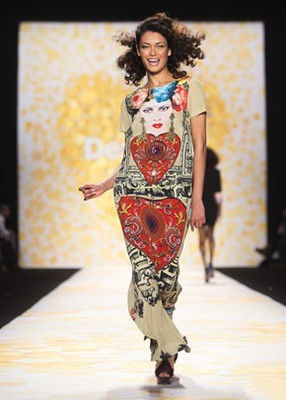服装零售
The dedicated followers of fast fashion
专注追随快时尚的他们
Spain's most successful fashion retailer, Inditex, has two ambitious local rivals snapping at its heels
西班牙最成功的时尚零售商Inditex正被两位野心勃勃的对手追赶
ON HIGH streets and in shopping centres across the globe, Spain's most successful clothing retailer, Inditex—best known for its Zara outlets—does battle daily against such other multinational fast-fashion giants as Hennes & Mauritz of Sweden, Uniqlo of Japan and Gap of the United States. But it also faces rising competition, at home and abroad, from two Spanish rivals, Mango and Desigual.
在全球各地的主要街道和商场内,西班牙最负盛名的服装零售商——Zara的拥有者Inditex集团,每时每刻都在和其他跨国快时尚巨头角逐,其中包括瑞典的H&M,日本的优衣库,以及美国的Gap。与此同时,随着两家西班牙对手,Mango和Desigual的登场,海内外的竞争愈演愈烈。

The larger of the two contenders, Mango is still fairly small: its turnover of 1.9 billion last year was less than one-fifth that of Inditex's Zara branches. But Mango already has more outlets than Zara, and is in more countries than Inditex as a whole. Mango plans to open lots more branches and increase its turnover to 5 billion by 2017.
虽然比Desigual略大,Mango的规模依旧较小:其去年19亿欧元的营业额还不到Inditex旗下分支Zara的五分之一。然而,Mango的店铺数量已经超过了Zara,分布在107个国家,这远远广于整个Inditex的地理分布。Mango还计划开设更多的分支品牌,并在2017年之前达到50亿的营业额。
Desigual is smaller still. It had sales of 828m last year, four-fifths of them outside Spain, and has outlets in 109 countries. It has expanded tenfold since 2007. Its heady growth has attracted the attention of Eurazeo, a French private-equity firm, which in March bought a 10% stake. This valued Desigual at 2.9 billion; Inditex's current stockmarket valuation is 70 billion.
Desigual比Mango还要小。去年它的销售额为8.28亿欧元,其中五分之四的销售额来自西班牙境外。Desigual在109个国家都有店铺,规模自从2007年以来增加了十倍。如此迅速的增长引人注目,一家法国的私募公司Eurazeo于三月购买了10%的股权。此交易使得Desigual的估价达到了29亿欧元;与之相比,Inditex目前的股价为700亿欧元。
Besides all being from Spain, the three retailers each have media-shy founders who have brought in outside managers to help them expand, explains Marcel Planellas of Esade Business School in Barcelona. Amancio Ortega of Inditex—Forbes reckons he is now the world's fourth-richest man—began by making bathrobes before opening the first Zara in 1975 in Galicia. His success blazed a trail for the other two. Isak Andic, Mango's Istanbul-born founder, started by selling imported goods at a market stall in Barcelona, and Desigual's Swiss-born Thomas Meyer made denim jackets in Ibiza. Mr Andic and Mr Meyer both opened their first shops in the mid-1980s, though Desigual was a late bloomer until its recent growth spurt.
这三家零售商的创始人不仅都来自西班牙,对媒体也避之不及。巴塞罗那ESADE商学院的Marcel称,他们都请来了职业经理人来帮忙扩大业务。据福布斯猜测,Indidex集团的阿曼西奥·奥尔特加已经成为了世界第四首富。他远在1975年在加利西亚第一家Zara开张之前,就开始制作浴袍。这为其他两位创始人开辟了一条道路。伊斯坦布尔出生的Mango创始人伊萨克·安蒂奇,靠着在巴塞罗那摆摊卖进口货起家;Desigual的托马斯·梅耶来自瑞士,在伊比萨靠制作牛仔夹克起家;安蒂奇先生和梅尔先生都在80年代中期开张了第一家店铺;不过Desigual倒是大器晚成,最近几年才开始突飞猛进。
Whereas its two younger rivals follow a more conventional fashion-retail model of changing their collections two to four times a year, Inditex constantly churns out new designs, to encourage consumers to return to its shops frequently. Inditex has about half of its clothes stitched together in Spain or nearby countries, so it can react fast to changing trends. This costs more but helps avoid fashion misses and markdowns. The other two, again following the industry's conventions, have largely outsourced production to Asia, though Desigual is also starting to stitch more clothes in Europe to get them into the shops faster.
Mango和Desigual虽然资历尚浅,但走的还是较为传统的时尚零售模式,平均一年更换两到四次服装系列。相比之下,Inditex则不断更新设计,以吸引回头客频繁光顾。Inditex大约一半的衣服都在西班牙或临近国家缝合,以便及时应对千变万化的潮流。尽管这样做的费用较高,却能有效避免过季过时、降价促销。在这点上,另外两家则依旧紧随行业惯例,把生产基本上都外包到亚洲。不过Desigual也开始在欧洲缝合衣服,以期能够更快把服装引入店铺。
Inditex has been able to do without advertising, relying on good store locations in big cities to attract custom. Desigual, in its rush to catch up, has created a buzz with controversial advertisements (such as a television spot in which a young woman, wishing to get pregnant, puts pinholes in her partner's condoms) and quirky promotions such as offering free clothes to shoppers who arrive in their underwear. Desigual promotes itself as a “lifestyle” brand, more like Nike than Zara. Its bold prints and carefree, Mediterranean vibe are almost as popular in France as they are in Spain, says its chief executive, Manel Jadraque, who is aiming to make France the company's biggest market by the end of this year. “If we can make it in Paris, the birthplace of fashion, we are doing well”.
Inditex依托在大型城市良好的店址做到了零广告。Desigual急于赶上,创造了不少颇具争议的广告和古怪的促销活动,如只穿内衣的上门顾客就能免费获赠服装。Desigual的公关形象是“生活方式”品牌,和Zara相比,倒是更像耐克。Desigual用图大胆,无拘无束,地中海风味浓郁,在法国和西班牙一样大受欢迎。首席执行官马内尔·哈德拉克立志要将今年年底前使法国成为该公司最大的市场。“巴黎是时尚的发源地,如果我们能在这儿成功,那就说明我们干得不错。”
Though Desigual has outlets all over the world, around nine-tenths of its sales are still in Europe, so it is unclear how far its vibe can travel. It has closed its shops in China to concentrate on other Asian markets, such as Japan. Inditex, in contrast, has more than 450 shops in China.
虽然Desigual的店址遍布世界各地,但有十分之九的销售额都来自欧洲,所以目前其前景不明。为了关注其他亚洲市场,它已经关闭了中国的店铺。与之相比,Inditex在中国的门店超过450家。
Mr Jadraque, seeing how crowded the budget end of fast fashion is getting, is targeting a slightly fancier segment of the market: in Spain Desigual's T-shirts start at 29 compared with around 13 at Zara and 10 at Mango. It sells its clothes through a variety of channels, such as wholesalers and department stores, and it has extended its brand into shoes, sportswear and cosmetics. So far, Desigual's focus on “fun and profit” is paying off. Last year its margin was 29%, higher than Inditex's and double that of Mango.
目睹日渐拥挤的平价快时尚市场,哈德拉克先生把目光投向了一个稍微花哨的市场:在西班牙,Desigual的T恤起价29欧元,而Zara和Mango的T恤只有13欧元和10欧元。Desigual的服装销售渠道多样,包括批发商和百货公司,而其品牌也已延伸至鞋类、运动服和化妆品。到目前为止,Desigual乐趣与利润并举的策略已经初见成效。去年利润率为29%,高出Inditex, 更是Mango的两倍。
Europe's recession hit Mango harder than its rivals. In 2011 it had to cut its prices and reinvent itself, ditching glitzier clothes to focus more on casual basics, says its chief executive, Enric Casi. Last year sales grew 9%, outpacing Inditex's. So far, Mango's shops have been relatively small, and aimed at young women. Emulating Inditex, it is now opening bigger ones that stock men's and children's clothes, sportswear and underwear, as well as a separate chain called Violeta by Mango, for women with fuller figures. All this means heavy spending on logistics, says Mr Casi, and less reliance on franchised outlets for growth.
欧洲的经济衰退给Mango带来的打击比其他对手都更严重。首席执行官安瑞·可卡西称,2011年时它不得不削减价格,重整旗鼓,摒弃华而不实的服装,转而专注于休闲风。去年销售额增长了9%,超越了Inditex。目前,Mango的店铺规模较小,主要针对年轻女性。不过,它也开始效仿Inditex,开放了更大的店铺,一并出售男装、童装、运动衣和内衣,同时开设了另一家名为Violeta的连锁店,主要服务体型比较丰满的女性。可卡西称,这一切都意味着更为沉重的物流开支,以及减少对特许经营店依赖的增长策略。
Such change is akin to altering Mango's DNA says Joan Enric Ricart of IESE, another business school in Barcelona—a formidable challenge. Even if all goes to plan, it will take almost a decade to get to where Zara's sales are now. Nevertheless, having two such ambitious rivals on its doorstep will surely keep Inditex on its toes.
琼安·瑞科·李卡特来自巴塞罗那的另一家商学院IESE,声称这样的改变无异于对Mango进行基因重组,可谓困难重重。即使一切都能按照计划进行,要想取得Zara目前的销售量也需要差不多十年功夫。不过,有这么两位竞争对手紧紧相随,足以叫Inditex时刻保持警醒。













